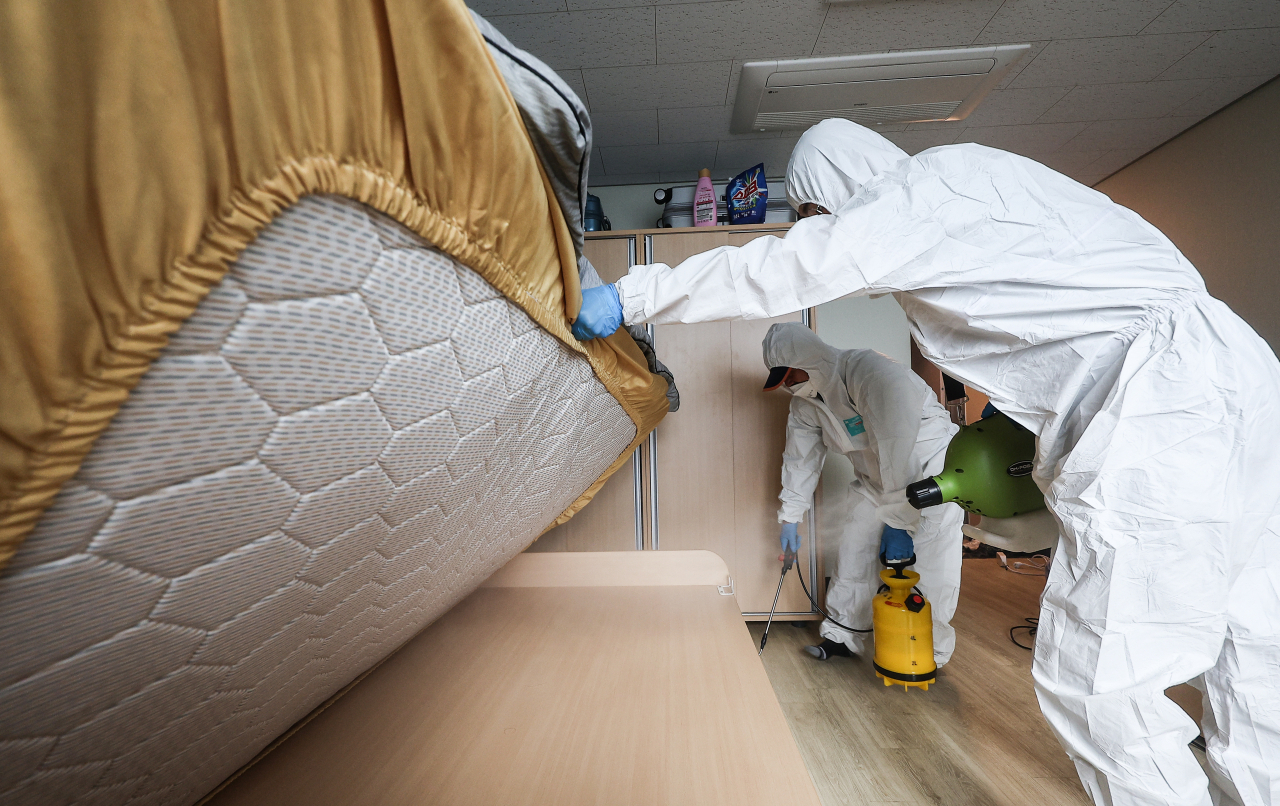 |
Workers disinfect a university dorm room in the southeastern city of Daegu on Oct. 19, following a report of bedbugs. (Yonhap) |
Fears of bedbugs are spreading nationwide, with some avoiding sitting on public transportation or visiting movie theaters, amid an increasing number of reported cases of bedbug appearances and damage.
In South Korea, bedbugs were nearly brought to eradication following sweeping disinfection campaigns in the 1960s and the adoption of the powerful pesticide dichloro-diphenyl-trichloroethane, commonly known as DDT, in the 1970s.
The country has, however, recently witnessed a surge in reports of bedbug appearances and damage nationwide.
Keimyung University in the southern city of Daegu had to disinfect the entire school after some students were bitten by bedbugs in the dormitory in mid-September.
A public sauna in Incheon, a populous city west of Seoul, also temporarily closed its business last month for disinfection after bedbugs and larvae were found under floor mats, marking the first bedbug case in years in the sauna's neighborhood.
Another case was confirmed last week at a goshiwon, a budget rent accommodation, in Jung Ward in central Seoul, where bedbugs were found inside mattresses and wallpaper in several rented rooms.
In Seoul alone, a total of 17 suspected bedbug reports have been filed from seven of the city's 25 districts, according to ward officials and district health centers.
Bedbugs feed on blood, mostly at night. They normally don't transmit infectious disease, but bedbug bites can lead to symptoms such as skin rashes, severe itchiness or allergic symptoms.
Many voiced hesitations about going to multiuse places, such as public transportation or movie theaters due to bedbug fears.
Yook Chae-rim, a student at Korea University, told Yonhap News Agency that she became anxious after hearing about a bedbug appearance from a friend who lives in another school's dormitory.
"Despite the hectic exam schedule, I completely stripped all bedding for laundry and had a massive cleaning of my room," she said.
A 28-year-old office worker who identified herself as Lee said she decided to avoid movie theaters altogether for a while due to fears of bedbug bites or having the creature carried to her home.
"I'm going to wait till the movies I like to see are added to streaming services," she said.
An online user also wrote Sunday she is feeling "crazy" because of her fears of her two old dogs and cat getting bitten by bedbugs.
"It is said that once bedbugs spread it's very difficult to eradicate them. My concerns about my pets' health are growing every day."
One private disinfection service company told Yonhap it was receiving two to three calls every day about bedbugs.
The company said it conducted insect cleanings in some 80 areas in Seoul last month, adding it is likely that the bugs may have spread citywide.
Following the establishment of a pangovernment team to fight the bedbug spread last week, the Korea Disease Control and Prevention Agency was to meet with pest control companies and pest experts Monday to assess bedbug reports and examine samples of bedbugs captured.
Seoul, whose high-density population of 9.4 million makes a bedbug infestation particularly risky, has also begun operating a bedbug report center, allowing people to quickly notify the city of bedbug appearances via public health centers or the city's special 120 Dasan public call service number. Reports can also be filed through a special banner on the city's website.
Once reports are filed, the city's ward offices will dispatch authorities to inspect the reported areas and ensure compliance with relevant regulations and necessary insect prevention measures.
Currently, intensive hygiene inspections are under way into 3,175 bedbug-prone public facilities in Seoul, such as hotels, other types of accommodations, public bathhouses and Korean public saunas, called "jjimjilbang."
Seoul also plans to hot-steam fabric seats on subways across the city on a regular basis and eventually replace fabric seating with other safer material. (Yonhap)







